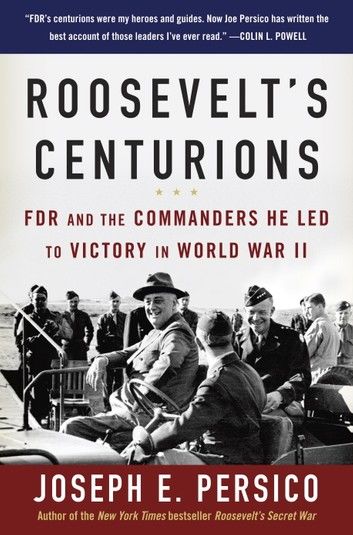| FindBook |
有 1 項符合
Roosevelt's Centurions的圖書 |
 |
Roosevelt's Centurions 作者:Joseph E. Persico 出版社:Random House Publishing Group 出版日期:2013-05-28 語言:英文 |
| 圖書館借閱 |
| 國家圖書館 | 全國圖書書目資訊網 | 國立公共資訊圖書館 | 電子書服務平台 | MetaCat 跨館整合查詢 |
| 臺北市立圖書館 | 新北市立圖書館 | 基隆市公共圖書館 | 桃園市立圖書館 | 新竹縣公共圖書館 |
| 苗栗縣立圖書館 | 臺中市立圖書館 | 彰化縣公共圖書館 | 南投縣文化局 | 雲林縣公共圖書館 |
| 嘉義縣圖書館 | 臺南市立圖書館 | 高雄市立圖書館 | 屏東縣公共圖書館 | 宜蘭縣公共圖書館 |
| 花蓮縣文化局 | 臺東縣文化處 |
|
|
“FDR’s centurions were my heroes and guides. Now Joe Persico has written the best account of those leaders I've ever read.”—Colin L. Powell
All American presidents are commanders in chief by law. Few perform as such in practice. In Roosevelt’s Centurions, distinguished historian Joseph E. Persico reveals how, during World War II, Franklin D. Roosevelt seized the levers of wartime power like no president since Abraham Lincoln during the Civil War. Declaring himself “Dr. Win-the-War,” FDR assumed the role of strategist in chief, and, though surrounded by star-studded generals and admirals, he made clear who was running the war. FDR was a hands-on war leader, involving himself in everything from choosing bomber targets to planning naval convoys to the design of landing craft. Persico explores whether his strategic decisions, including his insistence on the Axis powers’ unconditional surrender, helped end or may have prolonged the war.
Taking us inside the Allied war councils, the author reveals how the president brokered strategy with contentious allies, particularly the iron-willed Winston Churchill; rallied morale on the home front; and handpicked a team of proud, sometimes prickly warriors who, he believed, could fight a global war. Persico’s history offers indelible portraits of the outsize figures who roused the “sleeping giant” that defeated the Axis war machine: the dutiful yet independent-minded George C. Marshall, charged with rebuilding an army whose troops trained with broomsticks for rifles, eggs for hand grenades; Dwight Eisenhower, an unassuming Kansan elevated from obscurity to command of the greatest fighting force ever assembled; the vainglorious Douglas MacArthur; and the bizarre battlefield genius George S. Patton. Here too are less widely celebrated military leaders whose contributions were just as critical: the irascible, dictatorial navy chief, Ernest King; the acerbic army advisor in China, “Vinegar” Joe Stilwell; and Henry H. “Hap” Arnold, who zealously preached the gospel of modern air power. The Roosevelt who emerges from these pages is a wartime chess master guiding America’s armed forces to a victory that was anything but foreordained.
What are the qualities we look for in a commander in chief? In an era of renewed conflict, when Americans are again confronting the questions that FDR faced—about the nature and exercise of global power—Roosevelt’s Centurions is a timely and revealing examination of what it takes to be a wartime leader in a freewheeling, complicated, and tumultuous democracy.
|










